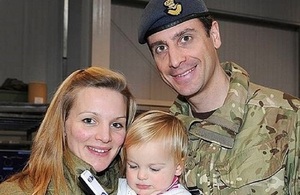Prime Minister announces employment support for armed forces community
Prime Minister David Cameron has announced support for the armed forces and their families with finding work when they leave the forces.

Armed forces family
On the 7th Armed Forces Day, the Prime Minister has announced that the government will extend its employment support programme to the whole of the armed forces.
The Career Transition Programme (CTP) helps personnel leaving the service to turn the skills, experience and qualifications they have gained into a successful career outside the military.
Over 200,000 ex-servicemen and women have benefitted from the CTP since it was launched and the changes announced today will mean nearly 3,000 partners and reservists can get help in finding work.
In a further show of support for the military, the government has also challenged the private sector to sign up to the armed forces covenant.
The Prime Minister, David Cameron, said:
Today, we celebrate our brave servicemen and women who work so hard to keep our country safe. It’s only right that once they leave the forces, we give them the support they need to find a job.
We also have a responsibility to our reservists and the families of our military personnel for the sacrifices they make. So for the first time we will help them to find work too. And today we are also calling on the private sector to play its part – by signing up to the armed forces covenant to help reservists and veterans into work.
I want everyone to have the security of a job and the opportunity to get on in life – and we particularly owe support to our veterans, their partners, and reservists.
Changes the government is making to the CTP programme will mean that, from 1 October:
-
for the first time all those leaving the armed services, regardless of how long they have served or their reason for discharge, will be able to use the CTP
-
Joint Forces Command and the Royal Air Force will run an initial 2-year Spouse Employment Support trial offering a limited number of places for eligible service spouses to access tailored employment support at selected locations
-
eligible reservists, regardless of whether they are in civilian employment or not will be entitled to help to find a job through the Reservists Employment Support Trial
The contract will continue to provide support such as training grants, subsidised vocational training and one-to-one career guidance. It also includes job finding support such as CV writing, job application techniques, work placements and interview skills.
Practical help with resettling will also be available such as guidance on pensions, housing, finance, career management and healthcare.
In a letter from the Defence Secretary, Michael Fallon, all FTSE 350 companies are also being challenged to show their support for the armed forces by signing the armed forces covenant.
They could do this by taking on more veterans and ex-service personnel, putting more measures in place to support their reservists and supporting partners of service personnel by guaranteeing special leave if needed, or flexible working.
Some of the big names that have pledged their support and signed up to the armed forces covenant this week include Lloyds Banking Group, JP Morgan, and the AA.
Only 39 of the FTSE 350 companies are currently signed up to the armed forces covenant – that’s just 11%.
Since the armed forces covenant was enshrined in law in 2011, the government has committed over £150 million, and this year has confirmed a permanent commitment of £10 million a year.
Chris Simpkins, Director General at The Royal British Legion said:
The Royal British Legion welcomes the government’s announcement, and in particular the support for service spouses and early service leavers. This was one of the Legion’s key asks in our Manifesto 2015, and we are pleased that it has been acted upon.
It is important that individuals who are leaving service are properly supported in their transition into civilian life and to compete in the jobs market. This announcement will help service leavers and their spouses receive the support they deserve.